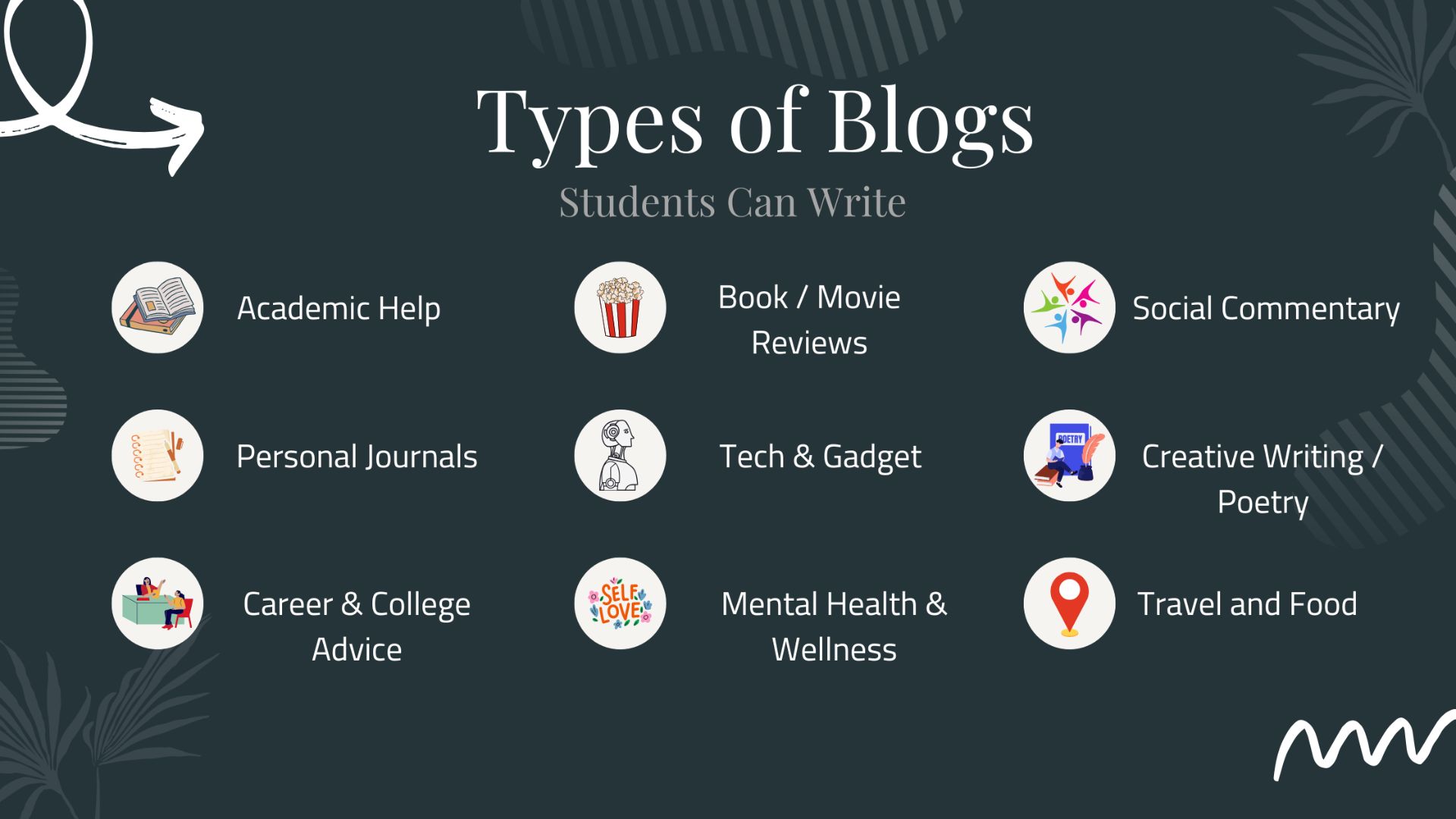“You don’t need to be an expert to start a blog—just a student with a voice, an idea, and the curiosity to share it.”
In the age of digital storytelling and personal branding, blogging has emerged as a powerful tool for students. Whether you’re in high school or college, starting a blog can boost your skills, showcase your interests, and even open up unexpected career opportunities. Here’s a comprehensive guide on how students can start blogging, why it matters, and how to do it right.

Why Students Should Start Blogging
- Improve Writing and Communication Skills: Writing regularly helps you articulate your thoughts better. It sharpens your grammar, vocabulary, and storytelling abilities—skills that are invaluable in academics and beyond.
- Build a Personal Brand: In today’s competitive world, having an online presence matters. A well-maintained blog can act as your digital resume, showcasing your interests, creativity, and expertise.
- Reflect and Express: Blogging encourages self-reflection. Whether you’re venting about college stress or sharing your passion for science, it becomes a creative outlet.
- Stand Out in College Applications or Job Interviews: A student with a personal blog demonstrates initiative, discipline, and passion. Admissions officers and employers love to see candidates who go the extra mile.
- Networking and Recognition: Through blogging, you can connect with like-minded people. Many student bloggers have been invited to speak at events or contribute to larger platforms.
- Example: Malala Yousafzai began writing blogs for BBC Urdu under a pseudonym about life under the Taliban. Her writing caught global attention and laid the foundation for her activism.
How to Start a Student Blog
- Choose a Platform: Start with platforms like WordPress, Blogger, Wix, or even Medium. They’re student-friendly and often free.
- Pick a Niche or Topic: Write about what excites you—technology, mental health, book reviews, college hacks, fashion, or academic tips. A focused niche helps attract a consistent audience.
- Set Goals: Are you blogging to improve your writing? To help fellow students? Or to build an online portfolio? Setting goals will guide your content.
- Create a Content Calendar: Planning posts in advance helps you stay consistent. Aim for one post a week or biweekly to begin with.
- Start Writing: Keep your tone natural and authentic. Don’t overthink. Your first blog doesn’t need to be perfect—just publish and learn.
How Long Does It Take to Write a Blog?
On average, a student blog of 800–1000 words may take:
- 30 minutes for research
- 1–2 hours to draft
- 30 minutes to edit and format
With practice, you’ll get faster and more efficient.
Types of Blogs Students Can Write

- Academic Help Blogs: Share study techniques, exam preparation tips, subject-specific hacks, or notes. These blogs are especially useful for peer-to-peer support and SEO traffic.
- Personal Journals: Write about your experiences, emotions, and day-to-day life as a student. This builds relatability and emotional connection with your readers.
- Career and College Advice: Document your journey of preparing for college, internships, or jobs. Share application strategies, resume tips, and interview experiences.
- Book or Movie Reviews: If you’re an avid reader or movie buff, review what you watch or read. Analyze themes, characters, and what others can learn from it.
- Tech and Gadget Blogs: Review mobile apps, student tools, gadgets, or new software. These are great for students in engineering or IT fields.
- Mental Health and Wellness: Talk about managing stress, productivity tips, or healthy routines. Such content resonates widely and can positively impact others.
- Social Commentary: Offer your thoughts on current affairs, student issues, campus events, or social trends. Make sure your tone is respectful and well-informed.
- Creative Writing or Poetry: Share your short stories, poems, or writing experiments. These blogs showcase creativity and are great for building a writing portfolio.
- Travel and Food Blogs: Even if you don’t travel far, write about places in your city or the best eateries near campus. Add photos for visual appeal.
- Student Organization or Event Blogs: If you’re part of a club or society, cover events, updates, and behind-the-scenes stories. These also help the organization gain visibility.
Real-Life Student Bloggers Who Made It Big
- Tavi Gevinson started her fashion blog at 12, which evolved into a media company.
- Ali Abdaal began blogging while in medical school and now runs a successful YouTube channel and podcast.
- Shivya Nath started travel blogging in college and became a full-time digital nomad and published author.
Strategies for a Successful Student Blog
- Be Consistent: Don’t disappear after publishing two posts. Set a realistic schedule and stick to it. Even once a month is better than random posts.
- Know Your Audience: Write as if you’re talking directly to your fellow students or a younger version of yourself. Keep it relevant to their concerns, struggles, and interests.
- Create Value: Every blog should offer something useful—tips, entertainment, advice, or inspiration. Think about what your reader will take away.
- Use SEO Basics: Learn simple SEO techniques like using keywords, writing descriptive titles, and optimizing your images. This helps people find your blog via search engines. Learn how to create an effective SEO strategy.
- Write Catchy Headlines: Titles like “5 Ways to Study Smarter” or “What I Learned Failing My First Exam” spark curiosity.
- Add Visuals: Photos, charts, or custom graphics break up text and improve readability. Free tools like Canva can help.
- Promote Your Posts: Share on student forums, WhatsApp groups, Instagram stories, LinkedIn, or relevant Reddit threads.
- Be Authentic: Your unique perspective is your superpower. Don’t copy others—write what you believe, feel, or have experienced.
- Encourage Interaction: Ask questions, run polls, or invite readers to comment or share. Engagement boosts visibility.
- Keep Learning: Read other blogs, take feedback seriously, and keep improving your content and design.
What to Include in a Blog Post
- Catchy Title
- Intro Paragraph that hooks the reader
- Clear subheadings
- Bullet points or numbered lists
- Personal anecdotes or stories
- A clear takeaway or call-to-action
How to Check Relevance and Keep Blogs Interesting
- Follow Trends: Google Trends, Reddit, or Quora can help.
- Use Keyword Tools: Try Ubersuggest, AnswerThePublic, or Google Keyword Planner.
- Ask Your Audience: What do your friends or classmates want to read?
- Update Old Posts: Keep your blog fresh by revisiting past content.
- Stay Authentic: Be YOU. People connect with honesty and personality.

Final Thoughts
Blogging as a student isn’t just a hobby—it’s a stepping stone to self-discovery, better communication, and potential career opportunities. It helps you find your voice, connect with others, and build something that lasts beyond school or college.
So pick your topic, start typing, and hit publish. Your future self will thank you.
FAQs: Blogging as a Student
- Q1. Do I need to be a great writer to start blogging?
Nope! Blogging is a journey. You get better as you write more. Start with your authentic voice—grammar and structure will improve over time. - Q2. What if I run out of ideas?
Start by writing about your daily student life, challenges, or what you wish someone told you earlier. Browse Reddit, Quora, or use AI tools to generate topic ideas. - Q3. Is blogging time-consuming?
Not if you plan well. A single blog post can take 2–3 hours a week. You can batch content or write during study breaks. - Q4. Can I make money from my blog as a student?
Yes! With consistent content and growing traffic, you can earn through ads, sponsored posts, affiliate links, or freelance opportunities. - Q5. Should I use my real name?
It’s up to you. Some students blog anonymously, but using your real name is a good idea if you’re building a personal brand. - Q6. What if no one reads my blog?
Every blogger starts at zero. Share it with friends, promote on social media, and keep at it. Growth comes with consistency.
Check Out Quickbuzz for Your Blogging Needs
Looking to streamline your blogging process? Quickbuzz is an AI-powered content automation platform that helps students and bloggers generate high-quality, SEO-optimized articles with ease. With its integration into WordPress, you can manage your blogging tasks effortlessly.